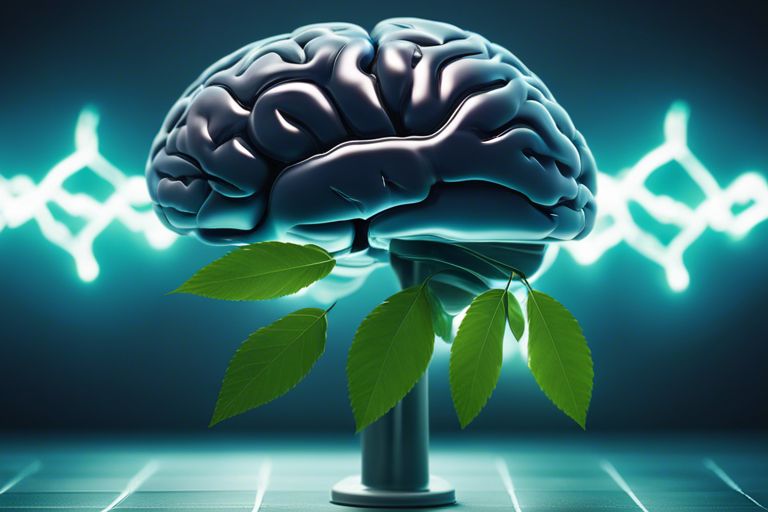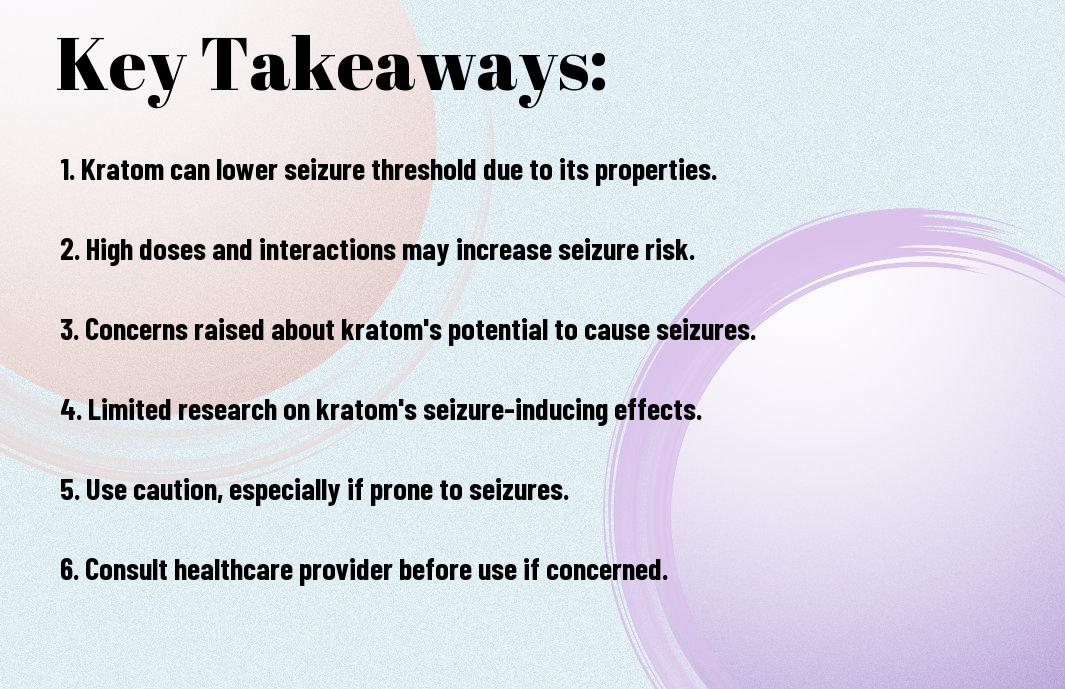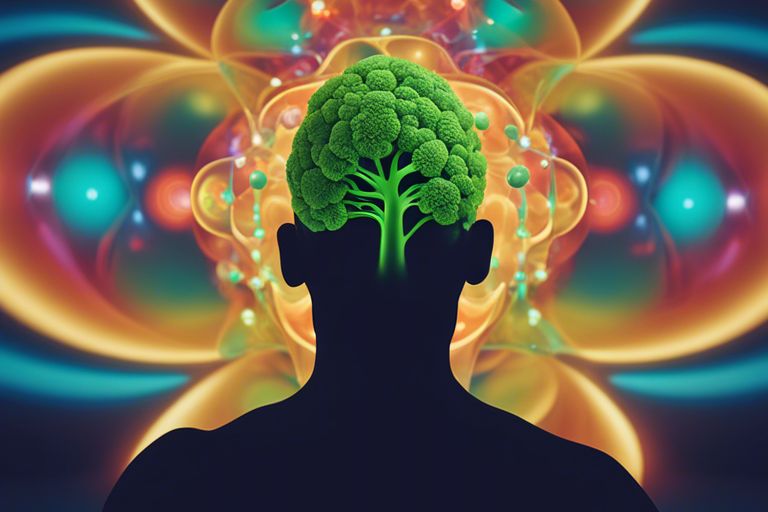Over the past few years, the herb kratom has gained popularity for its alleged medicinal properties. However, there is a growing concern about the potential side effects of kratom, including the risk of seizures. In this article, we will probe into the scientific evidence to answer the question: Can kratom cause seizures? Let’s uncover the facts behind this controversial topic.

Key Takeaways:
- Kratom and Seizures: There is limited research on the direct correlation between kratom use and seizures. However, some case studies have reported individuals experiencing seizures after consuming kratom.
- Potential Risk Factors: Various factors could contribute to the risk of seizures in kratom users, such as pre-existing medical conditions, drug interactions, or excessive dosage of kratom.
- Cautionary Approach: It’s necessary for individuals using kratom to be aware of the potential risks and consult with healthcare professionals if they have concerns about seizures or other adverse effects associated with kratom consumption.

What is Kratom?
The use of kratom, a tropical tree native to Southeast Asia, has gained popularity in recent years as an herbal supplement. It is known for its stimulating effects at low doses and sedative effects at higher doses. Kratom is often consumed by chewing its leaves, brewing them into a tea, or processing them into capsules, tablets, or concentrated extracts.
Origins and History
The origins of kratom can be traced back to countries like Thailand, Indonesia, Malaysia, and Papua New Guinea, where it has been used for centuries by indigenous populations for its medicinal and recreational properties. In traditional settings, kratom was often consumed to help enhance energy levels, relieve pain, or alleviate mood disorders.
Chemical Composition
Kratom contains over 40 different compounds, with the most active ones being mitragynine and 7-hydroxymitragynine. These alkaloids are responsible for the plant’s psychoactive effects, acting on the same receptors in the brain as opioids. Additionally, kratom contains other substances like flavonoids and polyphenols, which may contribute to its overall effects.
Any substance that interacts with opioid receptors in the brain can potentially lead to addiction, dependence, and other serious health risks. Kratom is not regulated by the U.S. Food and Drug Administration (FDA), which means that its purity and potency can vary widely between products. This variability can pose significant dangers to consumers, especially when using kratom in high doses or in combination with other substances.
With the growing popularity of kratom as a natural remedy for various ailments, it is important for consumers to be aware of the potential risks and benefits associated with its use. It is recommended to consult with a healthcare provider before using kratom, especially for individuals with a history of substance abuse or certain medical conditions.
The Effects of Kratom on the Brain
Clearly, kratom has a complex impact on the brain, leading to a range of effects that can vary based on dosage and individual differences. Two primary effects of kratom on the brain are stimulation and sedation.
Stimulation and Sedation
Any substance that affects the brain, like kratom, can result in stimulation or sedation depending on various factors. At lower doses, kratom tends to have stimulant-like effects, leading to increased energy, alertness, and sociability. Conversely, at higher doses, kratom can produce sedative effects, causing relaxation and potentially leading to drowsiness.
Interaction with Neurotransmitters
An important aspect of kratom’s effects on the brain is its interaction with neurotransmitters. Kratom contains alkaloids that can bind to opioid receptors in the brain, influencing the release of neurotransmitters like dopamine and serotonin. These interactions can result in mood enhancement, pain relief, and other effects.
It is crucial to understand how kratom affects neurotransmitters as this can help explain its potential for both positive and negative outcomes, including the risk of seizures in some individuals.
Seizures and Kratom Use
Keep in mind that while kratom is touted for its potential benefits, it is crucial to also be aware of the potential risks associated with its use. One concerning issue that has been raised is the potential for kratom to trigger seizures in some individuals.
Reported Incidents
Seizures have been reported in some cases where individuals have consumed kratom. Although the exact mechanism underlying this connection is not fully understood, it raises concerns about the safety of kratom use, especially in high doses or when combined with other substances.
Possible Mechanisms
With regards to the potential mechanisms linking kratom use to seizures, research suggests that kratom may interact with neurotransmitter systems in the brain, potentially leading to abnormal electrical activity that could trigger seizures. Additionally, some kratom products may be adulterated with other substances or contaminants that could contribute to this risk.
This highlights the importance of exercising caution when using kratom, particularly in high doses or when combining it with other substances. If you experience any unusual symptoms such as seizures while using kratom, it is imperative to seek medical attention promptly.
Risk Factors for Seizures
Despite kratom being hailed for its potential benefits, there are certain risk factors associated with its use that may increase the likelihood of experiencing seizures. By understanding these factors, individuals can make informed decisions about their kratom consumption.
Pre-Existing Conditions
To determine the risk of seizures from kratom use, it is crucial to consider any pre-existing conditions that may elevate this risk. Individuals with a history of epilepsy or other seizure disorders may be more susceptible to experiencing seizures when using kratom. Additionally, those with underlying neurological conditions or a history of head injuries should exercise caution when consuming kratom.
Dosage and Method of Consumption
For those considering using kratom, it is important to be mindful of the dosage and method of consumption. High doses of kratom have been linked to an increased risk of seizures, so it is crucial to start with a low dosage and gradually increase it as needed. Furthermore, the method of consumption can also impact the risk of seizures. Combining kratom with other substances or using kratom extracts may further elevate the risk of seizures.
Plus, individuals should be cautious when using kratom in any form and be aware of the potential risks associated with its consumption. Knowing the risk factors for seizures can help individuals make informed decisions about using kratom safely.
The Science Behind Kratom-Induced Seizures
Your inquiry into whether kratom can cause seizures researchs into the intricate workings of the human brain. By exploring the science behind kratom-induced seizures, we can better understand the potential mechanisms at play.
Serotonin and GABA Receptors
Receptors play a crucial role in how our bodies respond to substances like kratom. Serotonin receptors are involved in regulating mood, sleep, and seizures, while GABA receptors help to inhibit excessive brain activity. Kratom’s interaction with these receptors may lead to disruptions in normal brain function, potentially increasing the risk of seizures.
Brain Chemistry Imbalance
With an imbalance in brain chemistry, seizures can occur when there is an abnormal and excessive electrical discharge in the brain. Kratom’s effects on neurotransmitters and receptors may contribute to this imbalance, triggering seizure activity in susceptible individuals.
Understanding the intricate interplay between kratom and brain chemistry is crucial in unraveling the potential link to seizures. Further research is needed to fully comprehend the mechanisms involved and to assess the risks associated with kratom use.
Can Kratom Side Effects, Such as Heart Issues, Lead to Seizures?
There is concern about kratom’s effect on heart leading to seizures. While kratom can cause side effects such as increased heart rate and blood pressure, there is limited scientific evidence linking it directly to seizures. More research is needed to better understand the potential risks and benefits of using kratom.
Debunking Myths and Misconceptions
Separating Fact from Fiction
Debunking myths and misconceptions surrounding kratom is crucial in understanding its true effects. All Taking kratom claimed her son’s life. Now she and others … It’s vital to rely on scientific research and credible sources to separate fact from fiction when it comes to kratom use.
Addressing Common Concerns
Any concerns about kratom causing seizures or other adverse effects should be approached with caution and scrutinized carefully. While some anecdotal reports may suggest a link between kratom use and seizures, Understanding the potential factors at play, such as co-occurring medical conditions or other substances being used simultaneously, is vital. It is important to consult healthcare professionals for personalized advice and guidance on kratom use.
Conclusion
On the whole, while there is limited research on the topic, there is evidence that suggests that kratom may potentially lower the seizure threshold in some individuals. It is crucial for individuals considering kratom use to be aware of the potential risks, including seizures, and consult with a healthcare professional before use. Understanding the risks involved, such as those outlined in the Top 5 Dangers of Kratom Abuse, is important for making informed decisions about kratom consumption.
FAQ
Q: What is Kratom?
A: Kratom is a tropical tree native to Southeast Asia, known for its leaves that contain compounds with psychotropic effects.
Q: Can Kratom cause seizures?
A: There have been reported cases where kratom use has been associated with seizures, although more research is needed to establish a direct causal relationship.
Q: What are the potential risk factors for seizures related to Kratom use?
A: Some risk factors for seizures associated with kratom use include high doses, co-occurring medical conditions, and interactions with other substances.
Q: How does Kratom potentially trigger seizures?
A: The mechanism by which kratom may trigger seizures is not fully understood, but it is speculated that certain alkaloids in kratom may lower the seizure threshold in susceptible individuals.
Q: How can the risk of seizures from Kratom be minimized?
A: To minimize the risk of seizures associated with kratom, it is important to use kratom responsibly, avoid high doses, be aware of interactions with other substances, and monitor for any signs of adverse effects.









